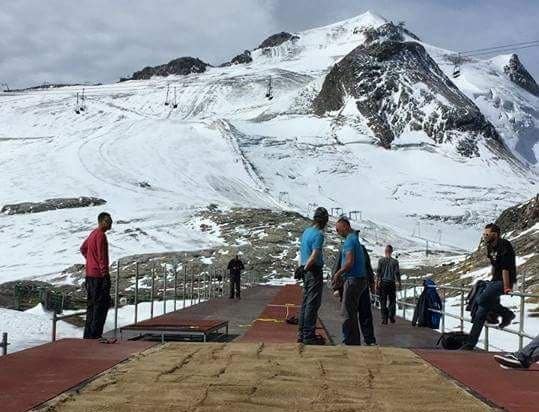Crowned world long jump champion in London last week, Luvo Manyonga has had his sights set on the world record for quite some time now. Maybe, on Wednesday in France, he’ll help South African athletics to yet another high.
Height (or rather altitude) is certainly going to make this a unique world record attempt. If the Tuks/HPC-athlete or any of the other six athletes competing succeed in doing so, there’s bound to be some controversy because they are competing at 3032 metres above sea level on a specially-built long jump track.
Most of the previous world record attempts happened at sea level, and for this attempt athletes will warm up at an indoor facility in Tignes and then be flown up via a two-minute helicopter flight to the track in the Alps.
Mike Powell, who jumped 8.95m in 1991 at the Tokyo World Championships, holds the current world record.
Interesting to note is that when Bob Beamon (US) set his world record of 8.90m at the 1968 Olympic Games in Mexico City, he did so at an altitude of 2 250m. At the time it was argued that Beamon had an unfair advantage competing at such a high altitude.
Earlier this season, Manyonga set his South African record of 8.65m in Potchefstroom, which is ‘only’ 1341m above sea level.
In South Africa athletes often do high-altitude training in Dullstroom, which is 2077m above sea level, while the Tuks/HPC-rowers do their high-altitude training at the Katse Dam in Lesotho, which is at 2100m.
It will be a definite challenge for Manyonga and the athletes to compete at 3032m. The problem with competing at high altitude is that there’s less oxygen, which means an athlete’s respiratory rate and heart rate speed up.
Neil Cornelius (Tuks/HPC coach) made it clear that this is not going to be a case of fools rushing in where angels fear to tread.
‘We’ve planned for the world record attempt. Karen Gibbs (physiotherapist) has been helping Luvo with special breathing exercises to prepare him for competing at 3000m. We also made provision for special thermal clothing should it be really cold in the mountains.’
Cornelius admits that many an athlete has in the past failed when officially going for a world record.
‘Although all of this has especially been organised to help the athletes set a world record, Luvo is not obsessed with jumping a specific distance. Obviously, we want Luvo to do that really big jump. I honestly believe he is capable of doing something remarkable.
‘But nothing is going to change. Our approach will be the same as at the World Championships in London. Luvo’s goal will be to make sure that his first jump counts, because we believe that with a good first attempt you ‘buy’ five more jumps. It’s also important that Luvo should have fun because of the more relaxed he is, the better he performs.
‘Competing at such a high altitude certainly creates its unique challenges. For example, I know that Luvo is going to be much faster in his approach than normal, so we will have to make certain adaptions to it to compromise for the extra speed.’
As to whether the IAAF will recognise a world record set at such a high altitude, Cornelius said he foresees no problems. ‘All of this is legal. What might happen is that the statisticians will put an ‘A’ in brackets behind whatever distance is jumped to indicate it happened at altitude. Personally, I don’t view this as any different than Luvo jumping at Tuks, which is also at altitude.’
According to Cornelius, the organisers have set three days aside for this world record attempt. If the weather is not perfect, the athletes might only compete on Thursday or Friday. But all indications are that conditions on Wednesday will be as near perfect as can be.
There will also be an attempt at the world triple jump record at the same time. It is understood that Olympic long jump champion Jeff Henderson (US) and compatriot Christian Taylor, world triple jump champion, will also be competing.
In the picture is the specially-built competition area for the world record attempt





